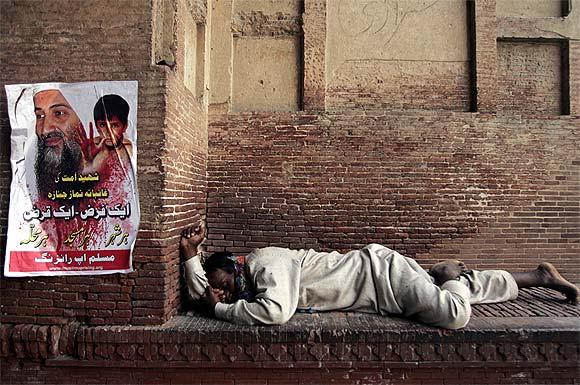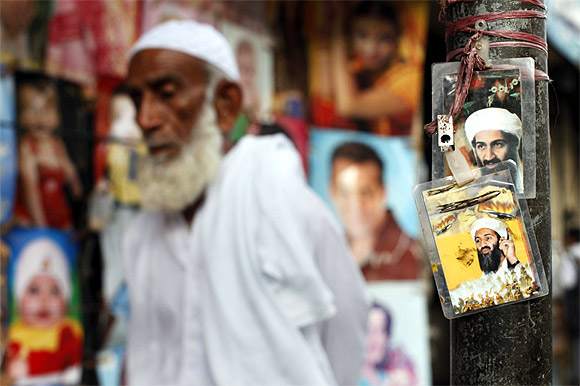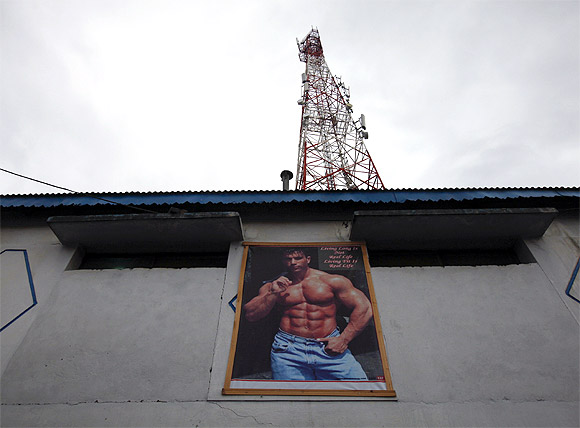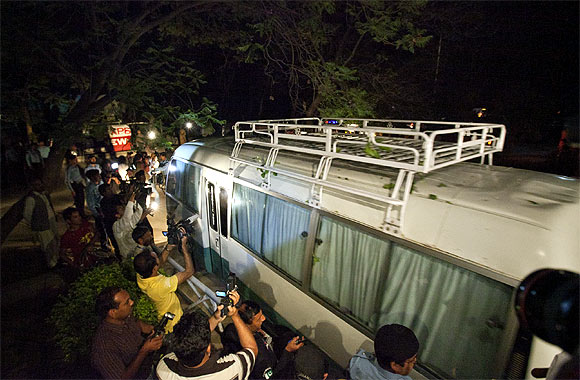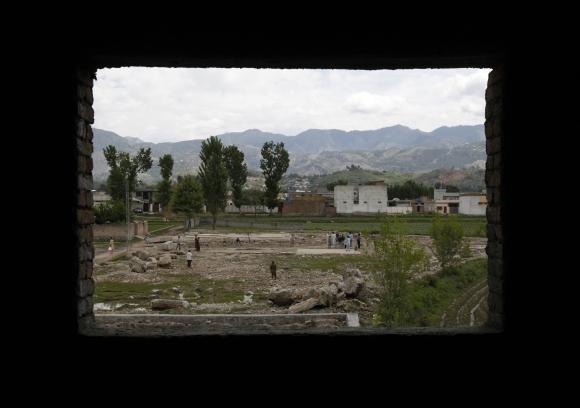 | « Back to article | Print this article |
Osama has left behind a saga of mystery and terror
Though Pakistani authorities tried their best to close the chapter of Osama bin Laden in a brisk manner, they couldn't do so, says Tahir Ali
Although a year has passed since Al Qaeda leader Osama bin Laden was killed in the garrison city of Abbottabad by United States Navy Seals, many questions related to his life and his stay inside Pakistan remain unanswered.
From the day of the 9/11 attacks on the US, which he orchestrated, till his death on May 2, 2011, Osama and his whereabouts remained a mystery. Often, even his staunch followers were uncertain about whether he was alive.
Osama remained a mystery even after his death, as many questions about his life in Pakistan and the way he lived remain unanswered. How he managed to reach Abbottabad, settle there and remain under the radar for such a long time are some such unanswered questions.
Click on NEXT for more...
Was Osama actually killed?
A judicial commission, formed by the Pakistan Supreme Court, was supposed to find these answers but it couldn't give too many satisfactory explanations.
The commission was asked to find out if indeed it was Osama who had been killed by the US Navy Seals. It was also supposed to find out who leaked information about Osama's presence in Abbottabad, how the US carried out the raid and why Pakistani intelligence agencies remained unaware about all these developments.
The judicial commission, formed on June 21 last year under the leadership of Justice Javed Iqbal, interviewed the civil and military leadership of Pakistan. It also interviewed some leading political leaders apart from the chiefs of the Pakistan Peoples Party and the Pakistan Muslim League-Nawaz.
The commission reportedly interviewed more than a hundred people, including the widows of Osama, but could not reach a conclusion about whether the person killed in the raid was the dreaded chief of Al Qaeda.
Click on NEXT for more...
Fingers have been pointed at Pakistan
The commission, which was supposed to submit its final report at the end of last year, is yet to do so over four months after the deadline.
According to government sources, the commission is in the final stages of penning down its recommendations. After the emergence of the memo scandal that rocked the Pakistani administration, the Osama commission got sidelined, say sources.
Fingers have been pointed not only at the government but even the intelligence agencies, which have faced questions about how Osama managed to remain in Abbottabad for such a long time without being noticed. Some media reports claimed that Osama had been kept hidden in Pakistan with a special motive in mind, but his hosts got no time to shift him to a safe place when the US Special Forces launched their raid.
The commission also interviewed former Inter Services Intelligence chief Ahmed Shuja Pasha. Although the SC body didn't have the power to seek action against anybody, it still did so in the case of Dr Shakil Afridi, who helped the US administration find Osama through a fake polio campaign.
Click on NEXT for more...
How could Pak agencies miss Osama's presence?
A statement by Amal, the youngest wife of Osama, further complicated the job of the commission.
Amal revealed that before settling down in Abbottabad, Osama and his family had lived at five different places in Pakistan. The commission will now have to talk to government and intelligence officials at the other places where the Al Qaeda chief had lived.
This revelation again raises the question of how Pakistani intelligence officials could miss Osama's presence in the country, especially when one of his wives even gave birth to his child in a government-run hospital.
Last week, the committee's spokesman (retired) Colonel Mohammad Irfan Naziri said its findings may not be released publicly.
Speaking about the commission's investigation, a US official said, "We are disappointed. They promised to do it (complete the probe), but they haven't yet."
Click on NEXT for more...
The Osama episode cannot be buried
Although it is not clear whether the Barak Obama administration believes the official line by the ISI, that the failure to detect Osama's presence was an intelligence failure on its part, no concrete evidence of any complicity between Osama and Pakistani agencies has emerged so far.
Though Pakistani authorities tried their best to close the chapter of Osama bin Laden in a brisk manner after his death, they couldn't do so.
The three-storey compound in Abbottabad -- where the world's most wanted person spent the last five years of his life -- was razed in a night-time operation while 14 of his family members were deported. Even the rubble has been removed from the site.
Today, local children play cricket at the site of the razed compound.
But the Osama episode cannot be buried so easily and hurriedly, as he symbolised an ideology that still has considerable hold in this part of the world. The ideology of Osama is influencing Taliban and other Pakistani militant factions.
In fact, the ideology of terror preached by Osama has become stronger after his death and continues to attract youngsters to jihad.
Click on NEXT for more...
TOP photo features of the week
Click on MORE to see another set of PHOTO features...
